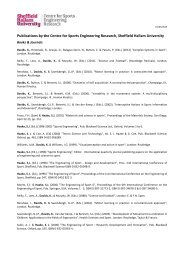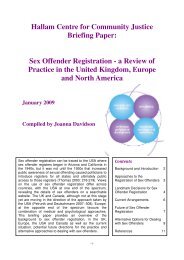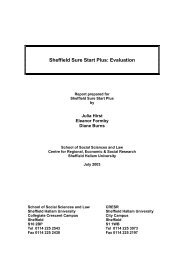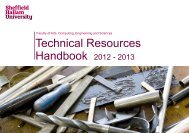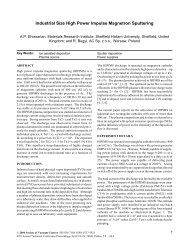The exercise of judicial discretion in rent arrears cases - Sheffield ...
The exercise of judicial discretion in rent arrears cases - Sheffield ...
The exercise of judicial discretion in rent arrears cases - Sheffield ...
Create successful ePaper yourself
Turn your PDF publications into a flip-book with our unique Google optimized e-Paper software.
A further concern is that <strong>in</strong> busy courts, it is impossible for judges who grant an application to<br />
suspend, or who adjourn it, or fix a date for review, to reserve the file to themselves. This<br />
led to judges be<strong>in</strong>g “more likely to start aga<strong>in</strong>, take a step back” (DJ C). <strong>The</strong> likelihood that<br />
<strong>cases</strong> listed for review would return to the same district judge was said to be “the great<br />
advantage <strong>of</strong> sitt<strong>in</strong>g <strong>in</strong> a small court” (DJ M). DJ K expressed the view that:<br />
“It’s obviously easier for judges to deal with <strong>cases</strong> that they already know about, so<br />
<strong>judicial</strong> cont<strong>in</strong>uity is very helpful <strong>in</strong> that respect. […] If it’s not one <strong>of</strong> your <strong>cases</strong>, then<br />
you are hav<strong>in</strong>g to rely on somebody else’s notes and they may vary…”<br />
Another <strong>in</strong>terviewee compla<strong>in</strong>ed that deputy district judges were reluctant to:<br />
“grasp the nettle. From their po<strong>in</strong>t <strong>of</strong> view also, it doesn’t matter much, because<br />
they’re not go<strong>in</strong>g to be here tomorrow, are they?” (DJ G)<br />
Conclusion<br />
District judges found it challeng<strong>in</strong>g to <strong>exercise</strong> their <strong>discretion</strong> <strong>in</strong> applications to suspend<br />
warrants, be<strong>in</strong>g acutely aware that their decision would have an immediate impact on the<br />
tenant’s life, and that <strong>of</strong> any family members. Although a number <strong>of</strong> factors were likely to be<br />
consistently taken <strong>in</strong>to account by all judges <strong>in</strong>terviewed, most particularly the presence <strong>of</strong><br />
children <strong>in</strong> the household, their responses to the scenarios varied considerably.<br />
Applications to suspend warrants were also the type <strong>of</strong> case which prompted many judges to<br />
directly address the tenant <strong>in</strong> a direct and <strong>in</strong>terventionist manner, referr<strong>in</strong>g them to sources<br />
<strong>of</strong> advice and warn<strong>in</strong>g them that this was their ‘last chance’ to rema<strong>in</strong> <strong>in</strong> their home.<br />
Issues <strong>of</strong> consistency and fairness caused some concern to judges themselves <strong>in</strong> these<br />
<strong>cases</strong>, particularly where district judges did not have the full case file, and where they had to<br />
rely on a colleague’s notes <strong>of</strong> what had <strong>in</strong>fluenced a previous decision to suspend the<br />
warrant.<br />
101



